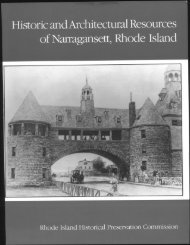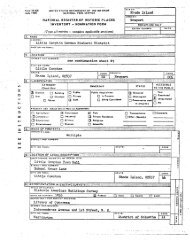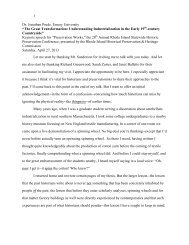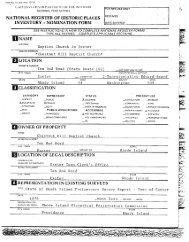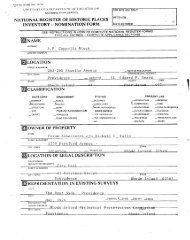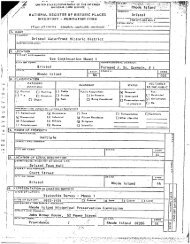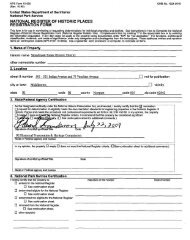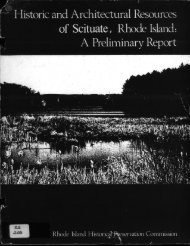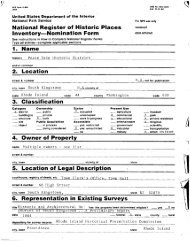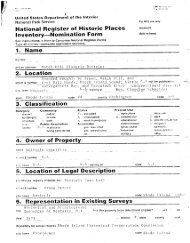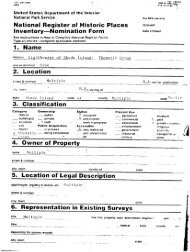National Register of Historic Places Registration Form
National Register of Historic Places Registration Form
National Register of Historic Places Registration Form
You also want an ePaper? Increase the reach of your titles
YUMPU automatically turns print PDFs into web optimized ePapers that Google loves.
________________NPS <strong>Form</strong> 10-900 0MB No. 1024-0018Rev. 8-88United States Department <strong>of</strong> the Interior<strong>National</strong> Park Service<strong>National</strong> <strong>Register</strong> <strong>of</strong> <strong>Historic</strong> <strong>Places</strong><strong>Registration</strong> <strong>Form</strong>1. Name <strong>of</strong> Propertyhistoric name: Clement Weaver - Daniel Howland Houseother name/site number:Clement Weaver House2. Locationstreet & number: 125 Howland Roadnot for publication:N/Acity/town: East Greenwich vicinity: N/Astate: RI county: Kentcode: 003 zip code: 028183. ClassificationOwnership <strong>of</strong> Property:Category <strong>of</strong> Property:buildingprivateNumber <strong>of</strong> Resources within Property:ContributingNoncontributing1 1 buildingssites1structuresobjects2 1 TotalNumber <strong>of</strong> contributing resources previously listed in the <strong>National</strong> <strong>Register</strong>: 0Name <strong>of</strong> related multiple property listing:N/A
________________________________-USDI/NPS NRHP <strong>Registration</strong> <strong>Form</strong> Page 2Propertynarne Clement Weaver - Daniel Howland House, Kent County, R.I.4. State/Federal Agency CertificationAs the designated authority under the <strong>National</strong> <strong>Historic</strong> Preservation Act <strong>of</strong> 1986, aü amended, I hereby certify that thisX nomination request for determination <strong>of</strong> eligibility meets the documentation standards for registeringproperties in the <strong>National</strong> <strong>Register</strong> <strong>of</strong> <strong>Historic</strong> <strong>Places</strong> and meets the procedural and pr<strong>of</strong>essional requirements set forth in36 CFR P 60. In my opinion, the property X meets does not meet the <strong>National</strong> <strong>Register</strong> Criteria.- See continuation sheet.Signature <strong>of</strong> certifying <strong>of</strong>ficial Date* FQCyState or Federal agency and bureauIn my ãpinion, the property meets does not meet the <strong>National</strong> <strong>Register</strong> criteria.See continuation sheet.Signature <strong>of</strong> commenting or other <strong>of</strong>ficialDateState or Federal agency and bureau5. <strong>National</strong> Park Service Certification .I hereby certify that this property is:entered in the <strong>National</strong> <strong>Register</strong>See continuation sheet.determined eligible for the<strong>National</strong> <strong>Register</strong>See continuation sheet.determined not eligible for the<strong>National</strong> <strong>Register</strong>removed from the <strong>National</strong> <strong>Register</strong>other explain:-..Signature <strong>of</strong> KeeperDate<strong>of</strong> Action6. Function or Use -<strong>Historic</strong>: DOMESTIC Sub: single dwellingCurrent:DOMESTICSub:singledwelling
USDI/NPS NRHP <strong>Registration</strong> <strong>Form</strong> Page 2Propertyname Clement Weaver - Daniel Howland House, Kent County, P.1.4. State/Federal Agency CertificationAs the designated authority under the <strong>National</strong> <strong>Historic</strong> Preservation Act <strong>of</strong> 1986, as amended, I hereby certify that thisX nomination request for determination <strong>of</strong> eligibility meets the documentation standards for registeringproperties in the <strong>National</strong> <strong>Register</strong> <strong>of</strong> <strong>Historic</strong> <strong>Places</strong> and meets the procedural and pr<strong>of</strong>essional requirements set forth in36 CFR Part 60. In my opinion, the property ...... meets _. does not meet the <strong>National</strong> <strong>Register</strong> Criteria.See continuation sheet.Signature <strong>of</strong> certifying <strong>of</strong>ficialDateState or Federal agency and bureauIn my opinion, the property meets does not meet the <strong>National</strong> <strong>Register</strong> criteria.See continuation sheet.Signature <strong>of</strong> commenting or other <strong>of</strong>ficialDateState or Federal agency and bureau5. <strong>National</strong> Park Service CertificationIhereby certify that this property is:entered in the <strong>National</strong> <strong>Register</strong>See continuation sheet.determined eligible for the<strong>National</strong> <strong>Register</strong>* See continuation sheet.determined not eligible for the<strong>National</strong> <strong>Register</strong>removed from the <strong>National</strong> <strong>Register</strong>other explain:Signature <strong>of</strong> KeeperDate<strong>of</strong> Action6. Function or Use<strong>Historic</strong>:DOMESTICSub: single dwellingCurrent: DOMESTIC Sub:singledwelling
_________________________________________________USDI/NPS NRHP <strong>Registration</strong> <strong>Form</strong> Page 3Property name Clement Weaver - Daniel Howlànd House. Kent County, P.1.7. DescriptionArchitectural Classification:PostmedievalEnglishOther Description:Materials: foundation STONE ro<strong>of</strong> SHINGLEwalls WOOD/weatherboard otherDescribe present and historic physical appearance.XSee continuation sheet.8. Statement <strong>of</strong> SignificanceCertifying <strong>of</strong>ficial has considered the significance <strong>of</strong> this property in relation to other properties:Applicable <strong>National</strong> <strong>Register</strong> Criteria: A & CCriteria Considerations Exceptions:statewideAreas <strong>of</strong> Significance:ARCHITECTUREEXPLORATION/SETTLEMENTPeriods <strong>of</strong> Significance: 1679-C. 1750Significant Dates: 1679Significant Persons:N/ACultural Affiliation:Architect/Builder:undefinedUnknownState significance <strong>of</strong> property, and justify criteria, criteria considerations, and areas and periods <strong>of</strong> significancenoted above.XSee continuation sheet.
__ ____ ________ ________ ________ _________USDI/NPS NRHP <strong>Registration</strong> <strong>Form</strong> Page 4Property name Clement Weaver - Daniel Howland House. Kent County. P.1.9. Major Bibliographical References.X...See continuation sheet.Previous documentation on file NPS:preliminary determination <strong>of</strong> individual listing 36 CFR 67 has been requested.previously listed in the <strong>National</strong> <strong>Register</strong>previously determined eligible by the <strong>National</strong> <strong>Register</strong>designated a <strong>National</strong> <strong>Historic</strong> Landmarkrecordedby <strong>Historic</strong> American Buildings Surveyrecorded by <strong>Historic</strong> American Engineering Record #Primary Location <strong>of</strong> Additional Data:XState historic preservation <strong>of</strong>ficeOther state agencyFederal agencyLocal governmentUniversityOther -- Specify Repository:10. Geographical DataAcreage <strong>of</strong> Property: 1. 5 acresUTM References: Zone Easting Northing Zone Easting NorthingA 19 293680 4614660 BCDSee continuation sheet.Verbal Boundary Description: X See continuation sheet.Boundary Justification: X See continuation sheet.11. <strong>Form</strong> Prepared ByName/Title: Virginia Adams, <strong>Historic</strong> ConsultantOrganization: The Public Archaeology Laboratory, Inc. Date: May. 1987Street & Number: 210 Lonsdale Avenue Telephone: 401-728-8780CityorTown: Pawtucket State: P.1. ZIP: 02860
NFS <strong>Form</strong> 1040048-86United States Department <strong>of</strong> the Interior<strong>National</strong> Park ServiCe<strong>National</strong> <strong>Register</strong> <strong>of</strong> <strong>Historic</strong> <strong>Places</strong>Continuation Sheet0MB ApproIt NO. 14COIIPropertyname Clement Weaver - Daniel Howland House, Kent County. P.1.Section number 7 * Page 5DescriptionThe Clement Weaver House, originally constructed in 1679, is a storyand-a-halfclapboarded and shingled house with a gable ro<strong>of</strong>, a large stoneand brick chimney approximately at its center and a single-story ell, witha massive stone end chimney, on the south. The house is in goodcondition, retaining overall integrity <strong>of</strong> its seventeenth-century design,materials, workmanship and appearance on its original site. The housefaces east and is set back approximately fifty feet from Howland Road in arural, residential area. Woods behind the house and simple landscapingprovide an appropriate immediate setting. A well in front east <strong>of</strong> thesouthern ell and a non-contributing, twentieth-century, one-story shingledframe garage south <strong>of</strong> the house and close to the road comprise the othervisible structural features on the 1 1/2-acre property.The main section <strong>of</strong> the house as it presently appears has an atypicaland asymmetrical five-bay facade, and a lopsided five-room, center-chimneyplan. Both the facade and the plan are the result <strong>of</strong> four different phases<strong>of</strong> construction. The first section <strong>of</strong> the house was a single great roomwith a tall half-story garret above; the huge stone and brick chimney, now<strong>of</strong>f-center in the house, originally rose just inside its northern end.Norman Isham, Rhode Island’s pioneer architectural historian, studied thehouse in the l930s and probably supervised some restoration work. Thefirst addition to the house was a single-story lean-to across the northernside <strong>of</strong> the chimney. This was very soon lengthened and its ro<strong>of</strong> raised toprovide a second garret united with the southern garret under a common ro<strong>of</strong>but reached by a separate straight-run staircase see plan . The fourthchange was the addition <strong>of</strong> a lean-to across the rear <strong>of</strong> the house, givingthe ro<strong>of</strong>line a saltbox pr<strong>of</strong>ile and adding three more rooms on the firstfloor. The final phase <strong>of</strong> building was the addition <strong>of</strong> the southern ell,with its own massive stone fireplace. Windows in both the main block andell are 6/6 or 12/12 double hang sash, with the exception <strong>of</strong> two restoredcasements discussed below.Entry to the main section <strong>of</strong> the house is through a shallow enclosedporch located in the approximate center <strong>of</strong> the east facade; a deeperenclosed porch at the south corner provides access to the cellar. The mainentrance opens directly into a wide but shallow stair hall. Ahead rise theseparate garret staircases, straight runs <strong>of</strong> seven stairs on the south andeight stairs on the -north, which meet at the bottom in an awkward wedgeshape. These stairs were originally enclosed by floor-to-ceiling verticalsheathing and a board-and-batten door; but, in a change made sometime after
NPS <strong>Form</strong> 10-900-a OMO Approval No. 1024-00188-86United States Department <strong>of</strong> the Interior<strong>National</strong> Park Service<strong>National</strong> <strong>Register</strong> <strong>of</strong> <strong>Historic</strong> <strong>Places</strong>Continuation Sheet -Property name Clement Weaver - Daniel Howland House, Kent County, P.1.Section number 7 Page 61940, the sheathing was cut to less than half its height, simple rails ansquare newels were added, and the door was removed entirely.South <strong>of</strong> the stair hall, entered through a board-and-batten door witha wooden latch and strap hinges, is the main room, 18 by 17 feet, with ahuge brick fireplace on its north wall. The firebox measures six feetacross the front and is 30 inches deep. Its rear wall is ornamented with arectangular panel <strong>of</strong> herringbone brickwork, with a recessed brick paneloutlined in headers above it. Treatments appear to be original. The sidefacings <strong>of</strong> the firebox, particularly in front, show signs <strong>of</strong> modernrepointing and probably <strong>of</strong> rebuilding. Antoinette E. Downings’s EarlyHomes <strong>of</strong> Rhode Island 1937 indicates that at that time this firebox had- curving flanks, and was partially filled by a later smaller fireplace.Above the heavy lintel 8 feet long by 13 inches tall a plaster covecurves up to meet the chamfered, exposed chimney girt. The exposed summerbeam, plates and end girt are also chamfered, with lamb’s-tongue stops.Three twelve-over-twelve sliding sash windows--two on the east, cut intothe plate, and one on the south--light the room. Built into the southwestcorner <strong>of</strong> the room is a simple, very early corner cupboard with a boardand-battendoor. The l930s restoration <strong>of</strong> this room included opening thefireplace and rebuilding or repointing its flanks and removing the casingswhich covered the summer beam, girts, plates, and corner posts; presumablysome replastering <strong>of</strong> walls and ceilings and replacement <strong>of</strong> flooring, windowsash, and doors were involved as well. The floor here and throughout thefist floor and staircases are covered with carpeting and are not visible.The north front room opening <strong>of</strong>f the stairhall, originally the leanto,is the one on which Norman Isham appears to have focused his attention,for it now has a somber seventeenth-century appearance. It measures 10 by17 feet, matching the great room in depth but being much narrower in width.Occupying most <strong>of</strong> its southern wall is the fireplace, with firebox 30inches deep by 93 1/2 inches wide at the front, spanned by a heavychamfered lintel. The firebox is built with stone flanks and hearth andstone and brick back wall with a central recessed panel underlined byheaders and a segmental-arched bake oven at the right. This room has nosummer beam, apparently because its narrowness did not require one; theceiling joists are evenly spaced approximately 21 inches on center.Exposed plates, girts and all corner posts have lamb’s-tongue-stoppedchamfers except the southwest post which has a rough gunstock haunch,perhaps a result <strong>of</strong> cutting the post back when the rear lean-to was addedand a door to it was built. Restoration in this room presumably includedopening the fireplace as well as removing the plaster from walls and
NPS <strong>Form</strong> 10.900-a 0MB Approval No. 1024-00188-86United States Department <strong>of</strong> the Interior<strong>National</strong> Park Service<strong>National</strong> <strong>Register</strong> <strong>of</strong> <strong>Historic</strong> <strong>Places</strong>Continuation SheetPropertynarne Clement Weaver - Daniel Howland House, Kent County. P.1.Section number 7 Page 7ceiling, replacing. the vertical feather-edged wall sheathing and board-andbattendoor as needed, and installing two casement windows with leadedrectangular panes, for which Isham found evidence in the house. To quoteDowning,". .. these windows give some <strong>of</strong> the best evidence we have forseventeenth-century casements. The entire restored room presents anexcellent picture <strong>of</strong> a seventeenth-century interior in Rhode Island"Downing 1937:33The back three rooms are simply finished with plastered walls andceilings and cased plates and posts. The central rear room has a brickfireplace with a simple flat surround, a set <strong>of</strong> three recessed shelvesabove, a small cupboard to the upper left, and a closet to the rightprobably a much later addition, although appropriately closed by a battendoor with wooden handle and strap hinges.The southern kitchen ell, probably a mid-eighteenth-century addition,is a single room with a small pantry east <strong>of</strong> the stone chimney mass. Thefirebox is separated by a foot-wide stone partition into two sections, theeastern one 38 inches deep by 50 inches wide at the front and the westernone 38 inches by 43 inches. Half <strong>of</strong> this fireplace had been filled in andwas opened c. 1940. The very rough girts, plates, and posts are exposedbut the ceiling is plastered it was a plank ceiling in 1940 , the floor iscovered with flagstones, and the room is now a modern kitchen.The garrets are similar to each other--each has a segmental-archedbrick fireplace and the pitch <strong>of</strong> the ro<strong>of</strong> defines the east and west walls--but the southern garret is larger and more finished. The fireplace herehas an eighteenth-century surround, mantel, and paneled over mantel and akind <strong>of</strong> gypsumboard has been used for a flat ceiling, to fill in betweenthe slanting rafters on the east, and to form a straight wall on the west,where framing corner post and plate is exposed which shows the change inthe ro<strong>of</strong>line. The north garret is smaller, simpler no mantel at all , and- has a high ceiling formed by the ro<strong>of</strong> itself. In both garrets the widefloorboards are visible and seem to be early if not original.Although no archaeological investigations have occurred, the areasurrounding the Clement Weaver House is likely to contain associatedarchaeological resources such as outbuilding foundations, discrete andscattered artifact deposits and evidence <strong>of</strong> landscaping.NOTE: Both interior and exterior photographs accompany thisnomination. One photograph <strong>of</strong> the main facade taken in 1974 is includedfor its completeness <strong>of</strong> image, and the interior photographs were taken in
NPB <strong>Form</strong> 1040048-86United States Department <strong>of</strong> the Interior<strong>National</strong> Park Service<strong>National</strong> <strong>Register</strong> <strong>of</strong> <strong>Historic</strong> <strong>Places</strong>Continuation Sheet0MB Approval NO. t4.0O15Property name Clement Weaver - Daniel Howland House, Kent County. P.1.Section number 7 Page 81980. The house is, however, essentially unchanged, as a 1995 site visitattests.
NPS <strong>Form</strong> 10-900-a 0MB Approval No. 1024-00188.88United States Department <strong>of</strong> the Interior<strong>National</strong> Park Service<strong>National</strong> <strong>Register</strong> <strong>of</strong> <strong>Historic</strong> <strong>Places</strong>Continuation SheetProperty nameSection numberClement Weaver - Daniel Howland House. Kent County. P.1.7 Page 9bULIcHeAPNA5 I U F}A5E Jfl TiNr
Nfl <strong>Form</strong> 10-900-a8-86United States Department <strong>of</strong> the Interior<strong>National</strong> Park Service<strong>National</strong> <strong>Register</strong> <strong>of</strong> <strong>Historic</strong> <strong>Places</strong>Continuation Sheet0MB Approval No. l0240018Property name Clement Weaver - Daniel Howland House. Kent County. P.1.Section number 7 Page 10PHAS. + PHASE S HA5 2 mA. INr
NPS <strong>Form</strong> 10-900-a8-88United States Department <strong>of</strong> the Interior<strong>National</strong> Park Service<strong>National</strong> <strong>Register</strong> <strong>of</strong> <strong>Historic</strong> <strong>Places</strong>Continuation Sheet0MB Approval No. 102400l8Property name Clement Weaver - Daniel Howland House. Kent County.P. I.Section number7Page 11b&KMEADPHA5!1°--IT71I3-PIlAtS ii PI4tE 1ENr
NPS <strong>Form</strong> 10-900-a 0MB Approval No- 1024-00188-86United States Department <strong>of</strong> the Interior<strong>National</strong> Park Service<strong>National</strong> <strong>Register</strong> <strong>of</strong> <strong>Historic</strong> <strong>Places</strong>Continuation SheetPropertyname Clement Weaver - Daniel Howland House. Kent County, P.1.Section number 8 Page 12SignificanceThe Clement Weaver House is architecturally significant for its age,rarity, and essential seventeenth-century integrity. The house is alsoimportant as the house <strong>of</strong> one <strong>of</strong> East Greenwich’s first settlers,reflecting the town’s early scattered agricultural settlement pattern.Prior to King Philip’s War 1675-76, the East Greenwich area andlands to the south known as the Narragansett Country were occupied byNarragansett Indians and thus largely inaccessible to colonists forsettlement. With the defeat <strong>of</strong> the Indians, and in response to claims onthe territory made by Connecticut, the Phode Island General Assemblyfounded the town <strong>of</strong> East Greenwich in 1677. Clement Weaver was one <strong>of</strong> theoriginal 48 grantees and settlers and, in 1679, constructed or hadconstructed a small house on 117 1/4 acres <strong>of</strong> land given to him inrecognition <strong>of</strong> his service during the war. Clement Weaver d. 1691married Rachel Andrew in 1677; they eventually had seven children, whichmay explain at least the first two additions to the house made duringWeaver’s occupation. -The house stayed in the Weaver family until 1748 when Joseph Weaver,yeoman, <strong>of</strong> East Greenwich, sold it and 104 acres <strong>of</strong> land with allappurtenances to Daniel Howland, yeoman, <strong>of</strong> Portsmouth for 3,000 pounds.The farm passed to Thomas Howland, presumably Daniel’s son, and from theestate <strong>of</strong> Thomas Howland to John Greene <strong>of</strong> Warwick; the farm at this timeincluded only about 50 acres, with a dwelling and other buildings, andbrought $2,500. John Greene sold the property to his daughter AbigailSusan, wife <strong>of</strong> Daniel Howland, executor <strong>of</strong> Thomas Howiand’s estate, for"love" and the sum <strong>of</strong> $100 the same day he purchased it, December 11, 1845.By the time <strong>of</strong> the next transfer <strong>of</strong> ownership in 1868 from Abigail andDaniel Howland to Peleg C. Kenyon <strong>of</strong> Cincinnati, Ohio, and John P. Kenyon<strong>of</strong> Warwick, Rhode Island for $5,000, several lots had been added to thefarm, bringing it back to about 100 acres. Peleg Kenyon subsequently soldhis half to Thomas E. Kenyon <strong>of</strong> East Greenwich for $2,500 in 1876. In1930, Katherine S. Flowland purchased the whole 100-acre farm with dwellingand other buildings and improvements from various Kenyon heirs for the sum<strong>of</strong> $10.00. Photographs <strong>of</strong> the house at this time show it as a vacant,weather-worn shell <strong>of</strong> a house with window-glass missing and shinglesmouldering, a picturesque "colonial ruin," which partly explains the lowprice. Katherine Howland, widow <strong>of</strong> Daniel Howland, sold the same parcel toC. Ellsworth Gale, Jr., <strong>of</strong> Warwick in 1940, after which time, in subsequenttransfers, the landholding associated with the house was reduced to itspresent size. It appears that Norman M. Isham and his associate, Edwin F.
NPS <strong>Form</strong> 10-900-a - 0MB Approval No. l02400188-86United States Department <strong>of</strong> the Interior<strong>National</strong> Park Service<strong>National</strong> <strong>Register</strong> <strong>of</strong> <strong>Historic</strong> <strong>Places</strong>Continuation SheetPropertyname Clement Weaver - Daniel Howland House, Kent County, P.1.Section number 8 Page 13Cull, set to work on the house sometime in 1937, presumably for ownerEllswworth Gale.Norman Morrison Isham 1864-1943 was an architect practicing inProvidence, Rhode Island where he taught architecture at Brown Universityand the Rhode Island School <strong>of</strong> Design, serving as head <strong>of</strong> PISD’sArchitecture Department from 1912 until 1920 and again from 1923 until1933. Ishahm was the first serious student <strong>of</strong> Rhode Island’s and southernNew England’s "first period" houses and public buildings. In such booksas Early Phode Island Houses with Albert F. Brown, Providence 1895 andEarly Connecticut Houses with Brown, Providence 1900 , he carefullystudied and sketched building techniques and forms used by seventeenth- andeighteenth-century housewrights. In his studies, where he advocatedpreparation <strong>of</strong> "accurate measured drawings" and collection <strong>of</strong> "scientificdata," Isham not only laid the groundwork for all subsequent research onearly New England houses, but he also documented many period houses whichhave since vanished from the landscape. -Isham directed or consulted on numerous restoration projects in RhodeIsland, several <strong>of</strong> which involved archaeological excavations as a method <strong>of</strong>collecting scientific data, and much <strong>of</strong> our current understanding <strong>of</strong> RhodeIsland’s early architecture has been informed by Isham’s work in the firstquarter <strong>of</strong> the twentieth century.Unfortunately, the location <strong>of</strong> records <strong>of</strong> Isham’s analysis andrestoration decisions for many <strong>of</strong> these projects, including the ClementWeaver House, is presently unknown. Isham is known to have visited otherearly houses in East Greenwich, and his notebooks contain pencil sketchesand measurement <strong>of</strong> plans and details, but there seems to be no record <strong>of</strong>any specific restoration recommendations.The "colonial ruin" must have proven to be quite a challenge. HABSphotographs, from 1931 though 1940, and other contemporaneous accounts,give some idea <strong>of</strong> the work involved. On the exterior, the house received anew wood shingle ro<strong>of</strong> and framing repairs where necessary; the north entryportico was rebuilt; double hung window sash were repaired or replaced withcasement windows where evidence existed; and existing shingle sidingappears to have been replaced by clapboards, as indicated by 1photographs from the period, 2 a note on Isham’s sketch plan, "oldclapboards under this ro<strong>of</strong> on main house," in the south ell addition, and3 the clapboards themselves which are in relatively good condition and <strong>of</strong>an early form, fastened with rosehead nails.
NPS <strong>Form</strong> 10-900-a 0MB Approval No. 102400188.88United States Department <strong>of</strong> the Interior<strong>National</strong> Park Service<strong>National</strong> <strong>Register</strong> <strong>of</strong> <strong>Historic</strong> <strong>Places</strong>Continuation SheetPropertyname Clement Weaver - Daniel Howland House. Kent County, P.1.Section number 8 Page 14On the interior, the north room was restored bringing it back to itsoriginal dark, sheathed, minimally-lit form; the great room was alsorestored, including uncovering <strong>of</strong> the framing and opening and rebuilding <strong>of</strong>part <strong>of</strong> the fireplace; and elsewhere selected restoration occurred whereappropriate.It is largely as a result <strong>of</strong> Ishamn’s restoration work that theClement Weaver House is clearly read as a seventeenth century house today.Relatively few houses were constructed during the seventeenth and earlyeighteenth centuries; <strong>of</strong> the perhaps two dozen serving Rhode Island housesconstructed before 1700, fewer still have escaped extensive alteration,both during the colonial period and later. The Clement Weaver Housereached its essential form by about 1700; subsequent modifications to therear <strong>of</strong> the house and addition <strong>of</strong> the south ell appear to have occurredprior to 1750. With the removal <strong>of</strong> most later eighteenth- and nineteenthcenturychanges, the house reveals design elements typical <strong>of</strong> seventeenthcentury architecture: such as its massive chimney, period framing, squareor horizontal casement windows, and in addition contains distinctive designvariants, notable the unusual double staircase. The Clement Weaver Housethus stands as an important record <strong>of</strong> the past as the oldest house in EastGreenwich and one <strong>of</strong> only a few seventeenth-century houses remaining inRhode Island.
NPS Farm 1O.E008-86United States Department <strong>of</strong> the Interior<strong>National</strong> Park Service<strong>National</strong> <strong>Register</strong> <strong>of</strong> <strong>Historic</strong> <strong>Places</strong>Continuation Sheet0MBftprcval Na. 141IProperty name Clement Weaver - Daniel Howland House, Kent County, P.1.Section number 9 Page 15Ma-jor Bibliographical PeferencesDowning, Antoinette F., Early Homes <strong>of</strong> Rhode Island, Garrett & Massie,Inc., Richmond, Va., 1937.Hitchcock, Henry-Russell, Rhode Island Architecture, M.I.T. Press,Cambridge, MA, 1939.Isham, Norman M. and Albert F. Brown, Early Rhode Island Houses,Providence, 1895.Lynch, Ancelin, "Clement Weaver House, Draft <strong>National</strong> <strong>Register</strong> Nomination,"unpublished manuscript, on file, Rhode Island <strong>Historic</strong>al Preservationand Heritage Commission. -<strong>National</strong> Cyclopedia <strong>of</strong> American Biography, James T. WHite and Co., NewYork, 1958, vol 42.Rhode Island <strong>Historic</strong>al Preservation Commission Statewide Report K-EG-l,East Greenwich Rhode Island, Providence, 1974.Rhode Island <strong>Historic</strong>al Preservation Commission, The Phode Island <strong>Historic</strong>Preservation Plan, Providence, 1986.Startup, Hetty, "The Clement Weaver House," unpublished manuscript on file,Phode Island <strong>Historic</strong>al Preservation Commission, 1987.Town <strong>of</strong> East Greenwich, unpublished land records and probate books, EastGreenwich, Town House.
NPS <strong>Form</strong> 10-900-a 0MB Approval No. 1024-00188-86 -United States Department <strong>of</strong> the Interior<strong>National</strong> Park Service<strong>National</strong> <strong>Register</strong> <strong>of</strong> <strong>Historic</strong> <strong>Places</strong>Continuation SheetProperty name Clement Weaver - Daniel Howland House. Kent County, P.1.Section number 10 Page 16Verbal Boundary Description and Justification- The nominated property encompasses Town Lot 77, Plat 10 and is 61,687square feet, or approximately 1.5 acres, in size.The boundary includes the entire town lot which now accompanies theproperty and which provides an appropriate immediate setting. Other landhistorically associated with the property is not precisely known and hasbeen largely subdivided.




